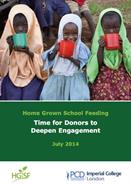Last Updated on Tuesday, 22 July 2014 09:23
Read more: Linking Local Rice Producers to School Feeding Markets in Mali
 News
News
Read more: Linking Local Rice Producers to School Feeding Markets in Mali
Drawing from the expertise of Brazil’s widely acclaimed national local procurement programme, five African countries are piloting their own indigenous models. This small-scale pilot project known as Purchase from Africans in Africa (PAA), is implemented by FAO, WFP, local governments, and the Brazilian Ministry of Foreign Affairs. Since its inception in 2012, PAA Africa has developed a complimentary approach to P4P, promoting the use of food items purchased from local smallholder farmers in WFP and government-run school feeding programmes.
Read more: Brazilian pro-smallholder procurement model inspires African governments
 A new policy paper, "Home Grown School Feeding: Time for Donors to Deepen Engagement", from Imperial College London's Partnership for Child Development analyses official donor involvement with HGSF, and recommends how it can be put further up donors’ agendas to increase potential impacts for farmers, children and the economic development of countries.
A new policy paper, "Home Grown School Feeding: Time for Donors to Deepen Engagement", from Imperial College London's Partnership for Child Development analyses official donor involvement with HGSF, and recommends how it can be put further up donors’ agendas to increase potential impacts for farmers, children and the economic development of countries.
The HGSF model where school meals made with food procured from local smallholder farmers can be described as a “win-win” - providing smallholder farmers with a fixed income, as well as enabling well fed children to learn and develop into healthy adults.
Despite the benefits of HGSF, donor support for this model varies considerably. As significant challenges remain in meeting global development goals on hunger, education and poverty, focusing attention on HGSF and other such innovative approaches which link agriculture, health and education sectors is crucial.
Read more: Alice Waters Says the Future of Food Is Sustainable and Locally Sourced
Page 10 of 38
Build and download your own nutritionally balanced and fully costed school meals with the easy to use HGSF Menu Planner